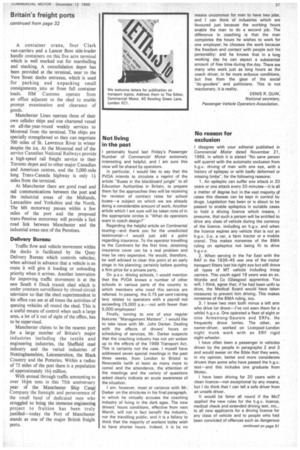Not living in the past
Page 75

If you've noticed an error in this article please click here to report it so we can fix it.
personally found last Friday's Passenger Number of Commercial Motor extremely interesting and helpful, and I am sure this view will be shared by operators.
In particular, I would like to say that the PVOA intends to circulate a reprint of the article "Buses in the blackboard jungleto all Education Authorities in Britain, to prepare them for the approaches they will be receiving for revision of contract rates for school buses—a subject on which we are already doing a considerable amount of work. Another article which I am sure will be taken note of in the appropriate circles is 'What do operators want in coach design?"
Regarding the helpful article on Continental touring—and thank you for the unsolicited testimonial—I would just add a point regarding insurance. To the operator travelling to the Continent for the first time, obtaining insurance cover can be a real problem and may be very expensive. He would, therefore, be well advised to clear this point at an early stage in his planning; certainly before quoting a firm price for a private party.
On p.s.v, driving schools, I would mention that the PVOA knows a number of other schools in various parts of the country to which members who need this service are referred. In passing, the 0.75 per cent training levy relates to operators with a payroll .not exceeding £5,000 pa.— not with fewer than 5,000 employees!
Finally, turning to one of your regular features "Management Matters", I would like to take issue with Mr. John Darker. Dealing with the effects of drivers' hours on scheduling of services, Mr. Darker suspects that the coaching industry has not yet woken up to the effects of the 1968 Transport Act. This is certainly not the case. I myself have addressed seven special meetings in the past three weeks, from London to Bristol to Newcastle (with at least as many more to come) and the attendance, the attention of the meetings and the variety of questions asked clearly indicate an acute awareness of the situation.
I am, however, most at variance with Mr. Darker on the strictures in his final paragraph, in which he virtually accuses the coaching industry of living in the dark ages. The new drivers' hours conditions, effective from next March, will not in fact benefit the industry, nor the travelling public, and it is a fallacy to think that the majority of workers today wish to have shorter hours. Indeed, it is by no
means uncommon for men to have two jobs, and I can think of industries which are favoured just because the working hours enable the man to do a second job. The difference in coaching is that the man completes the hours he wishes to work for one employer; he chooses the work because the freedom and contact with people suit his personality; and he knows that in a long working day he can expect a substantial amount of free time during the day. There are many who work just as long hours as the coach driver, in far more arduous conditions, but free from the gaze of the social -do-goodersand politicians. This is not reactionary, it is reality.
DENIS R. QUIN, National secretary, Passenger Vehicle Operators Association.
























































































































































